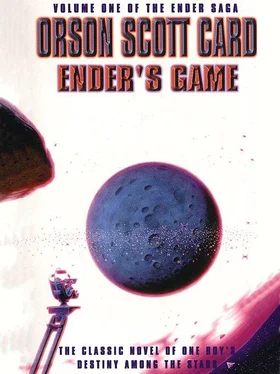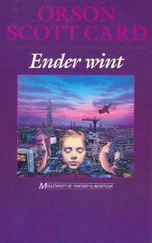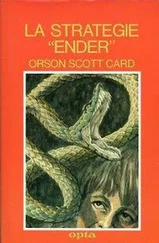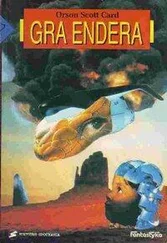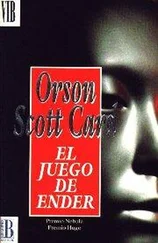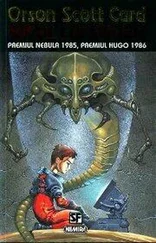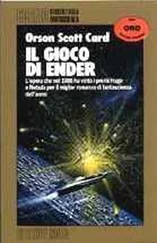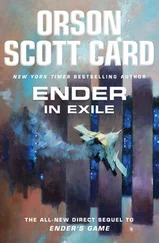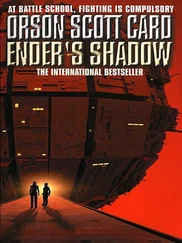Orson Scott Card
Ender's Game
For Geoffrey,
who makes me remember
how young and how old
children can be
Acknowledgments
Portions of this book were recounted in my first published science fiction story, "Ender's Game," in the August 1977 Analog, edited by Ben Boya; his faith in me and this story are the foundation of my career.
Harriet McDougal of Tor is that rarest of editors—one who understands a story and can help the author make it exactly what he meant it to be. They don't pay her enough. Harriet's task was made more than a little easier, however, because of the excellent work of my resident editor, Kristine Card. I don't pay her enough, either.
I am grateful also to Barbara Boya, who has been my friend and agent through thin and, sometimes, thick; and to Tom Doherty, my publishers who let me talk him into doing this book at the ABA in Dallas, which shows either his' superb judgment or how weary one can get at a convention.
It makes me a little uncomfortable, writing an introduction to Ender's Game. After all, the book has been in print for six years now, and in all that time, nobody has ever written to me to say, "You know, Ender's Game was a pretty good book, but you know what it really needs? An introduction!" And yet when a novel goes back to print for a new hardcover edition, there ought to be something new in it to mark the occasion (something besides the minor changes as I fix the errors and internal contradictions and stylistic excesses that have bothered me ever since the novel first appeared). So be assured—the novel stands on its own, and if you skip this intro and go straight to the story, I not only won't stand in your way, I'll even agree with you!
The novelet "Ender's Game" was my first published science fiction. It was based on an idea—the Battle Room—that came to me when I was sixteen years old. I had just read Isaac Asimov's Foundation trilogy, which was (more or less) an extrapolation of the ideas in Gibbon's Decline and Fall of the Roman Empire, applied to a galaxy-wide empire in some far future time.
The novel set me, not to dreaming, but to thinking, which is Asimov's most extraordinary ability as a fiction writer. What would the future be like? How would things change? What would remain the same? The premise of Foundation seemed to be that even though you might change the props and the actors, the play of human history is always the same. And yet that fundamentally pessimistic premise (you mean we'll never change?) was tempered by Asimov's idea of a group of human beings who, not through genetic change, but through learned skills, are able to understand and heal the minds of other people.
It was an idea that rang true with me, perhaps in part because of my Mormon upbringing and beliefs: Human beings may be miserable specimens, in the main, but we can learn, and, through learning, become decent people.
Those were some of the ideas that played through my mind as I read Foundation, curled on my bed—a thin mattress on a slab of plywood, a bed my father had made for me—in my basement bedroom in our little rambler on 650 East in Orem, Utah. And then, as so many science fiction readers have done over the years, I felt a strong desire to write stories that would do for others what Asimov's story had done for me.
In other genres, that desire is usually expressed by producing thinly veiled rewrites of the great work: Tolkien's disciples far too often simply rewrite Tolkien, for example. In science fiction, however, the whole point is that the ideas are fresh and startling and intriguing; you imitate the great ones, not by rewriting their stories, but rather by creating stories that are just as startling and new.
But new in what way? Asimov was a scientist, and approached every field of human knowledge in a scientific manner—assimilating data, combining it in new and startling ways, thinking through the implications of each new idea. I was no scientist, and unlikely ever to be one, at least not a real scientist—not a physicist, not a chemist, not a biologist, not even an engineer. I had no gift for mathematics and no great love for it, either. Though I relished the study of logic and languages, and virtually inhaled histories and biographies, it never occurred to me at the time that these were just as valid sources of science fiction stories as astronomy or quantum mechanics.
How, then, could I possibly conic up with a science fiction idea? What did I actually know about anything?
At that time my older brother Bill was in the army, stationed at Fort Douglas in Salt Lake City; he was nursing a hip-to-heel cast from a bike-riding accident, however, and came home on weekends. It was then that he had met his future wife, Laura Dene Low, while attending a church meeting on the BYU campus; and it was Laura who gave me Foundation to read. Perhaps, then, it was natural for my thoughts to turn to things military.
To me, though, the military didn't mean the Vietnam War, which was then nearing its peak of American involvement. I had no experience of that, except for Bill's stories of the miserable life in basic training, the humiliation of officer's candidate school, and his lonely but in many ways successful life as a noncom in Korea. Far more deeply rooted in my mind was my experience, five or six years earlier, of reading Bruce Catton's three-volume Army of the Potomac. I remembered so well the stories of the commanders in that war—the struggle to find a Union general capable of using McClellan's magnificent army to defeat Lee and Jackson and Stuart, and then, finally, Grant, who brought death to far too many of his soldiers, but also made their deaths mean something, by grinding away at Lee, keeping him from dancing and maneuvering out of reach. It was because of Catton's history that I had stopped enjoying chess, and had to revise the rules of Risk in order to play it—I had come to understand something of war, and not just because of the conclusions Catton himself had reached. I found meanings of my own in that history.
I learned that history is shaped by the use of power, and that different people, leading the same army, with, therefore, approximately the same power, applied it so differently that the army seemed to change from a pack of noble fools at Fredericksburg to panicked cowards melting away at Chancellorsville, then to the grimly determined, stubborn soldiers who held the ridges at Gettysburg, and then, finally, to the disciplined, professional army that ground Lee to dust in Grant's long campaign. It wasn't the soldiers who changed. It was the leader. And even though I could not then have articulated what I understood of military leadership, I knew that I did understand it. I understood, at levels deeper than speech, how a great military leader imposes his will on his enemy, and makes his own army a willing extension of himself.
So one morning, as my Dad drove me to Brigham Young High School along Carterville Road in the heavily wooded bottoms of the Provo River, I wondered: How would you train soldiers for combat in the future? I didn't bother thinking of new land-based weapons systems—what was on my mind, after Foundation, was space. Soldiers and commanders would have to think very differently in space, because the old ideas of up and down simply wouldn't apply anymore. I had read in Nordhoffs and Hall's history of World War I flying that it was very hard at first for new pilots to learn to look above and below them rather than merely to the right and left, to find the enemy approaching them in the air. How much worse, then, would it be to learn to think with no up and down at all?
Читать дальше
